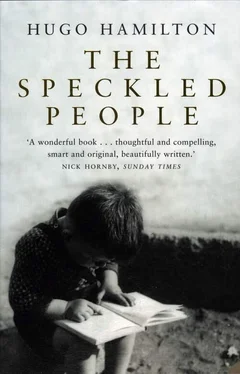On the way home I walked along the wall with the dog behind me. My shoes were squeaking all the way. There were white salt marks where they were already beginning to dry. The sun was starting to come through the mist and it was not going to rain after all. I looked back and saw the sun coming out. The water was so white and so full of bouncing light that I could see nothing at all. It made me want to close my eyes and sneeze. When I looked into the shadows under the trees it was so dark that I could see nothing there either. When you’re small you know nothing. I know the sea is like a piece of silver paper in the sun. I can see people walking along the seafront with ice-cream cones. I can hear the bells and I’m not afraid any more of being German or Irish, or anywhere in between. Maybe your country is only a place you make up in your own mind. Something you dream about and sing about. Maybe it’s not a place on the map at all, but just a story full of people you meet and places you visit, full of books and films you’ve been to. I’m not afraid of being homesick and having no language to live in. I don’t have to be like anyone else. I’m walking on the wall and nobody can stop me.
We’re trying to go home now. We’re still trying to find our way home, but sometimes it’s hard to know where that is any more. My mother went back to Germany one more time after my father died, just to visit everyone there and see where she grew up. But she was lost. She couldn’t recognise anything. Now she wants to find a place in Ireland that she can remember. She says we’re going on a trip to find things. She makes a big cake and we pack our bags with sandwiches and rain macs and get up early in the morning for the bus. We travel around the country to see places she went to before she got married, when she came over to Ireland on a pilgrimage, when Ireland was a holy country, full of priests and donkeys with crosses on their backs.
We came to a town where there was a carnival, with lots of people and loudspeakers playing music on the main street. There were vans selling things and a stall where you could throw wooden rings around a bottle of whiskey and win it. You could smell sweet things like candy floss and sometimes a mixture of things like chips and vinegar and diesel from the trucks. We went on the big wheel and I saw my mother and Ciarán getting smaller, waving at us below on the ground. We sat down on a bench outside the town to have the last bit of cake, with the music from the carnival still coming up and down on the wind. Then it’s great to see my mother laughing and laughing, because I threw an apple at her and she caught it. And when it was time to move on and she was trying to get up from the bench, we pushed her back down until she was laughing and laughing so much with tears in her eyes. How do we know if she’s happy or sad? It was getting late and she started looking for the place she remembered. She wanted to find the house that she stayed in once when she was a pilgrim after the war, coming back from Station Island.
‘It must be here,’ she said again and again.
We walked for a long time and she kept seeing lots of thing that she remembered, like stone walls and fields full of cows. Sometimes the cows stopped chewing to look at us as if they were surprised to see us in Ireland, so far away from home. It was the summer and we kept walking to keep ahead of the flies. We passed a house with a dog barking. One time, my mother spoke to a man to ask directions and we knew we were on the right road again. We just had to walk around another corner and find a gate where you could see the mountains, my mother said, with the sun going down like holy pictures. She wanted to speak to the woman of the house again where she stayed and the rain was praying the rosary all night. But we never found it. The night came up right behind us. We searched until it got dark and the colour was gone from the land and we could not see a thing any more. You could only smell the hay and the cow dung. It was so dark that you could only see with your nose, my mother said. Maybe she got the wrong road or the wrong mountains in the distance. She said Ireland had changed a bit. Or else it only existed in your imagination.
‘Maybe I dreamed it,’ she said.
We could see the lights of the next town in the distance. My mother took out a cigarette because she was free to smoke after my father died. We stood on the road and watched her face lighting up with the match. We smelled the new smoke in the clean air and waited. She said she didn’t know where to go from here. We were lost, but she laughed and it didn’t matter.
HUGO HAMILTON has published five novels, a collection of short stories, and this memoir The Speckled People . He was born and lives in Dublin.
Конец ознакомительного отрывка
Купить книгу












